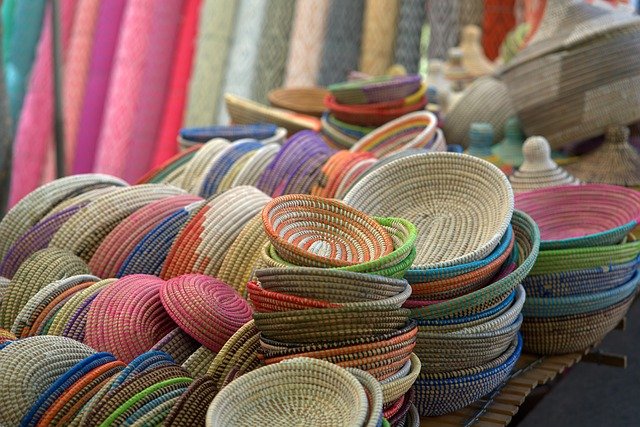I was in Richmond over the weekend and happened into quite a few vintage homegoods stores. Anyone who knows me knows I love to go antiquing and that vintage kitchen goods in particular are my weakness. These days I’m mostly just window shopping. After downsizing and getting rid of about 70% of my possessions, I’m trying to live a more minimalist life. However, after seeing a 1980’s casserole dish, I felt like I just had to have it!
I already have quite a few vintage casserole dishes in my collection, and I love them and use them regularly. However, this one was a different size and also looked very different from what I already had since all my others are Pyrex and this was one from the 1980s. It was white ceramic with a rainbow graphic and just looked very cool and very different from other ones I had seen. Suddenly I had visions of taking it to a potluck or a house party and having the people there say things to me like “What a cool casserole dish! Where did you get it?” I would play it off like it was no big deal, but people would see that clearly I was a cool person and belonged in their friend group.
I started listing to The Minimalist’s podcast regularly while I was downsizing and one of the things that they talk about is that in reality we really don’t need much. Anything extra we think we need, you’ll be fine without it. And if you buy that extra thing anyways? Who are you really buying it for? Were you buying it for you or to impress imaginary people?
I had watched a documentary called The Century of the Self, in it they blame the rise of “lifestyle marketing” in the 1950s for our current hyper-consumerism. Although it’s a really good documentary and I highly recommend it, I didn’t quite buy the premise. Some people spend above their means and others spend below. Neither me nor my husband really feel all that pulled by advertising. The things we often shell out on are not that visible and do nothing to elevate our social status. And I don’t think it’s because we are so much more enlightened or intelligent either. Clearly there’s something else at play here.
There’s a really interesting article on Vox right now called “Why do we buy what we buy”. In it they interview a sociologist from Boston University named Juliet Schor. Schor doesn’t buy the marketing argument either. Obviously you have to know a product exists in order to seek it out, so marketing helps in that respect. However, the bigger influencer is what tribe you feel you fit into and what that tribe is purchasing. If you feel that you fit into a wealthier tribe then you actually are, you will spend as if you were wealthier, and vis versa.
Think about a blogger, youtuber, or instagram influencer you like. You saw this person and thought “They’re like me!” so you subscribed. And after following them for a while you decided that you admired their lifestyle and started making similar purchases to them in part because you wanted other people to admire you too. This is how it happens.
Both me and my husband grew up with grandparents that were teenagers during the great depression. Those frugal ideals were passed down through the generations. Thus we feel we belong to a tribe that celebrates frugalism, simple living, self-sufficiency, and zero waste. Our clothes and outward appearance contains clues to others that this is who we are and to attract similar-minded individuals.
We don’t consciously realize it at the time, but much of our purchases and ways of being are meant to send social signals out to our tribe and non-tribe.
During the 4th of July festivities this past weekend I saw a vendor selling a T-shirt with an American flag on it that read “If this flag offends you, you can leave!” It’s hard to imagine anyone being offended by the American flag, but wearing a T-shirt like that definitely sends a clear social signal of what kind of person you are and who you are going to get along with. Social signals can be loud like the T-shirt or more subtle, like holding a Starbucks coffee or carrying around a yoga mat.
In the end I did not buy the casserole dish and days later I feel good about that decision. The truth is, I have a lot of beautiful things and don’t really need anymore. I do still like shopping and am still hopeful that I will eventually find my tribe here in Virginia. But in the mean time I am going to be more conscious about asking myself “Who am I really buying this for?”


